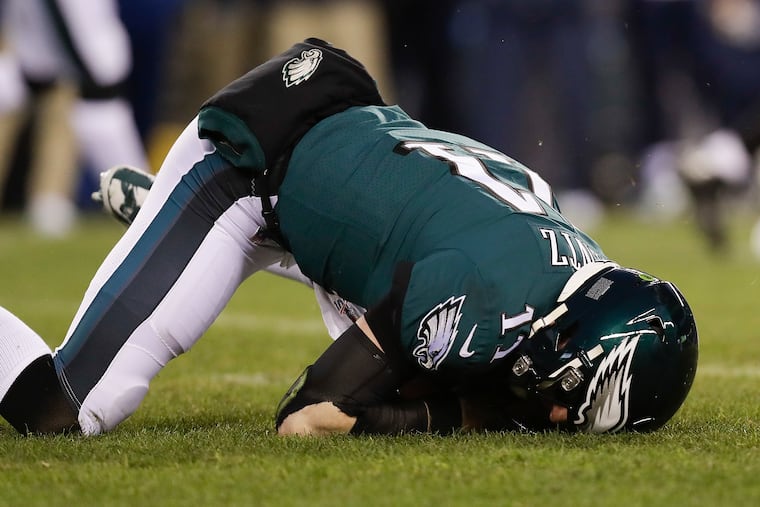Carson Wentz’s concussion was reason enough to bench him, but the injury’s effect is unclear
The Eagles were smart to bench Wentz after the hit by Jadeveon Clowney. If the quarterback is like most concussion patients, he will recover just fine, if he takes the time to heal.

The pendulum on how seriously to take concussions in football swung years ago, from the condition’s being minimized, ignored, or hidden to its being blamed for all manner of long-term damage and degenerative brain disease.
The reality? Concussion is a serious injury, meriting the caution shown by the Eagles when quarterback Carson Wentz was benched early in Sunday’s playoff loss to the Seattle Seahawks. But the science behind how this condition may impair long-term health — of a superbly conditioned athlete like Wentz or of anyone else — remains in its infancy.
Most people who suffer a concussion will recover completely if they allow the brain time to heal, said Douglas H. Smith, director of the Center for Brain Injury and Repair at the University of Pennsylvania’s Perelman School of Medicine.
Yet a minority of patients can suffer permanent damage to brain cells — specifically to the long, slender fibers called axons. Physicians, including Smith and his Penn colleagues, have attempted to identify this type of damage by measuring certain biomarkers in the blood — abnormal proteins that occur when these fibers degenerate.
“What concerns us are the individuals with higher levels of axonal proteins in their blood,” he said. “It’s beginning to look like those are the individuals with a greater chance of long-term problems. It may predict the patients who will have persisting symptoms.”
For now, these tests are the subject of research and are not approved as a clinical tool. Wentz will be evaluated instead on the basis of his symptoms, such as any ongoing deficits with his memory, balance, and vision.
In an Instagram post on Monday, the quarterback said he was “feeling good and will be just fine!”
“Head injuries are a scary thing so I appreciate everybody’s thoughts and prayers,” he wrote.
Smith, a scientific adviser to the NFL’s program to prevent brain injury, is not involved in Wentz’s care and declined to comment on his concussion, the result of a hit by Seattle’s Jadeveon Clowney.
If Wentz is like most people who suffer a concussion, he should be OK and will be back on the field next season. In the short term, his brain will need time to restore the disrupted chemical and electrical signals that are transmitted via “tracts” of fibers in the organ’s white matter.
As for the longer term, advocates for players and their families have raised alarm about a condition called chronic traumatic encephalopathy (CTE), marked by abnormal brain “lesions” that may result from repeated impacts to the brain.
But like the blood biomarkers, the science on that indicator remains preliminary, Smith said. In autopsies, these lesions can be found in the brains of some people who did not suffer repeated concussions. Physicians do not know how many concussions or subconcussive hits will result in CTE, nor do they know to what extent these lesions will impair brain function.
Weary of all the uncertainty? Here’s a final dose: Physicians do not even agree on what is meant by concussion. Smith said he has counted more than 30 “official” definitions by medical societies and other organizations.
Generally speaking, most define it as some level of neurological impairment resulting from a direct or indirect impact to the head. Think of the whiplash effect a person might suffer in a car crash, suffering a concussion because of the brain’s sudden back-and-forth movement inside the skull. The skull need not hit the inside of the car for the person to suffer serious symptoms.
But the degree and types of symptoms in a concussion vary from definition to definition. And none of the attempts to define the condition say anything about the underlying cause — the exact manner of chemical and electrical deterioration in brain cells — because so much remains unclear, Smith said.
He likened it to the old-fashioned usage of consumption to refer to what we now know as tuberculosis. Consumption was a description of wasting symptoms, not the underlying cause. Only later did researchers discover the culprit: a bacterial infection.
Physicians know, of course, that a concussion is caused by a head impact. But the details of exactly how much force, what type, and how it may translate to damage on the cellular level remain unclear, Smith said.
As any sports medicine specialist knows, some scary-looking head impacts do not appear to result in any impairment, while other seemingly mild collisions can spell trouble. Time will tell what, if any, long-term issues arise for Wentz, but the decision to take him out of the game was spot on.